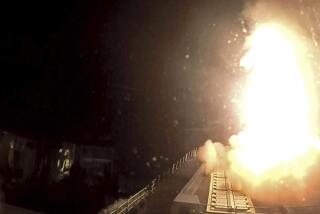Economics and the Route to War : Mideast: The American public is uneasy about the economic roots of the Persian Gulf crisis. Trade and finance have been at the heart of military conflicts throughout history.
- Share via
There have been few U.S. wars in which a vital economic interest loomed so large as in the Persian Gulf crisis.
While U.S. leaders have said their main goal is to deter Iraqi aggression, “we’re fighting for cheap gasoline, of course,” argues Stanley I. Kutler, a legal historian at the University of Wisconsin in Madison. “This is part of the definition of the American way of life.”
In fact, Americans are a bit queasy about resorting to combat for such crassly stated economic goals, public opinion polls suggest. Yet, rightly or wrongly, economic friction--over raw materials, trade routes, ports and territory--stands alongside ideology, religion and nationalism as a cause of bloodshed through the ages.
“It’s very hard to think of wars that don’t have an economic component,” said Robert Hunter, vice president at the Center for Strategic and International Studies in Washington.
Certainly, oil would not be the only precious commodity that has led armies to war over the years.
Starting in the 1400s, European powers traipsed through Asia, Africa and North and South America in quest of such coveted goods as gold, spices, textiles and raw materials to enrich themselves and supply their factories. Conquered lands didn’t always give up without a fight. The Aztecs in Mexico battled Spanish conquerors, as did the native Iroquois in New York against the French--to name just two examples in North America.
Economic rivalries of the colonial era also sparked battles among the conquerors, notably Great Britain, the Netherlands, France, Spain and Portugal. Clashes over commodities sometimes symbolized larger differences, such as between the ocean-going powers of Great Britain and the Netherlands in the 1600s.
“The Dutch would catch herring right under the noses of the British,” noted Charles P. Kindleberger, an economic historian at the Massachusetts Institute of Technology.
Economics also played a prominent role in the American Revolution. When a debt-saddled Great Britain imposed taxes on its American colonies, it prompted outraged cries of “taxation without representation.”
As is often the case, economics got entangled with other matters, including the colonies’ changing relationship with France and Spain. But the cause of revolt against Great Britain may have been a blend of economics and emotion: The spark “was the outrage to their dignity of being taxed without representation,” maintains Walt W. Rostow, an economic historian at the University of Texas in Austin.
Upon winning independence, the former colonies soon faced a radically different sort of tax issue.
The Barbary pirates of North Africa, accustomed to coercing payoffs--known as tributes--from merchant vessels in the Mediterranean, were picking on U.S. ships. On at least two celebrated occasions, they took American hostages and returned them only after the United States paid thousands of dollars in ransom.
Fed up, America sent a military expedition to the region in 1801. But it wasn’t until 1815 that Tunis, Algiers and Tripoli acquiesced to U.S. demands for freedom on the high seas.
Some historians draw an odd sort of analogy between the long-ago hostage incidents and America’s current problems in the Middle East. “It would be very interesting to see if Saddam Hussein ends up selling us our citizens again,” said Kindleberger.
Kindleberger credits the United States with asserting “a leadership role” in the Persian Gulf, the sort of act that is sometimes required in situations--such as the Barbary coast piracy--when individual nations may not feel compelled to take action, he said.
Decades after the Barbary skirmishes, the U.S. civil war was a clash in which economics took on the broadest possible meaning: “You had two different economic systems at war with each other--a free-labor system and a slave-labor system,” said Kutler. “That’s what it was all about.”
As America grew in power, it began to exercise its muscle abroad, often on behalf of its business interests in sugar, bananas, oil and other valued commodities in Latin America.
In a rather acid memoir, retired Marine Maj. Gen. Smedley D. Butler memorialized some of these episodes of the early 1900s: “And during that period I spent most of my time being a high-class muscle man for Big Business, for Wall Street and for the bankers. In short I was a racketeer for capitalism.”
The United States entered World War I to make the world “safe for democracy,” as President Woodrow Wilson put it. But critics later hammered at the dollars-and-cents aspects of the war. Postwar isolationists dubbed arms manufacturers “merchants of death.” And arms makers weren’t the only ones to profit: U.S. bankers lent so much money to Europe during the war, that America shed its status as a debtor nation and emerged as a major creditor.
World War II had more basic economic roots than World War I--at least in Asia--historians say. And as today, oil played a part.
In the years before the war, Japan forcibly expanded its regional power, attracted to oil, rubber, timber and other commodities in China and Southeast Asia. The United States fought back with a series of economic sanctions, withholding high-octane gasoline, scrap iron and oil from Japan.
In 1941, the United States struck a major blow, freezing Japanese assets in this country.
“You had two years of economic warfare before the Japanese attacked at Pearl Harbor,” observed Gaddis Smith, a historian at Yale University.
Some analysts point out that from Japan’s point of view, the U.S. economic steps were highly provocative. Japanese officials may have figured, “We (the United States) had colonized parts of the world. The French had done it. The British had done it. Why couldn’t they?” observed Richard Drobnick, director of the International Business Education and Research program at USC.
In a failed attempt to project global power, the British and French attacked Egypt in 1956 when Gamal Abdel Nasser--the powerful Egyptian leader nowadays compared to Saddam Hussein because of his rhetoric on Arab nationalism--seized the Suez Canal. The issue had an economic element: The waterway linked historic trade routes between the Mediterranean and the Gulf of Suez, leading to the Red Sea and Africa.
The attack was repudiated by the United States and Soviet Union, and the aggressors backed off.
“The fear was that when someone controls a strategic route of this kind, they can blackmail you,” said Helmut Sonnenfeldt, a senior fellow at the Brookings Institution in Washington and official in the Nixon and Ford administrations.
Neither the wars in Korea nor Vietnam are seen as essentially economic by most analysts, although some left-wing critics have claimed that the United States was interested in Vietnam’s offshore oil deposits.
By contrast, today’s crisis has an obvious economic element: the rising price of oil and gasoline, a wild card that could prove costly to consumers and business.
The political rhetoric surrounding America’s role, however, has emphasized other values, such as freedom and the need to resist aggression. Comparing Hussein to Hitler, President Bush declared in an Oval Office speech that “standing up for our principles is an American tradition.”
Recent opinion surveys suggest Americans prefer the high-minded justifications to any hint that possible fighting in the Middle East would be dictated at least in part by the need for reliable oil supplies.
In a Wall Street Journal/NBC News Poll last week, for example, 57% said that a serious oil shortage that threatened to cause a recession is not sufficient reason for America to use force. By contrast, 84% said an Iraqi invasion of Saudi Arabia would justify U.S. military action, and 72% said mistreatment of hostages would, as well.
“We’re a very materialistic culture, yet we’re squeamish about saying that our government is doing things for our material benefit,” observed Yale’s Smith.
One reason for the seeming contradiction may be that U.S. society has historically had a strong moralistic streak, said Seymour Martin Lipset, a sociologist at George Mason University in Fairfax, Va. As a result, “You always go to war against the evil empire” and not for cold-blooded, financial interests.
“What makes the gulf situation so difficult,” he added, is that the nations we are helping, such as Kuwait and Saudi Arabia, are notably undemocratic.
Others say that the economic issues of the crisis have implications far more profound than a mere change in gasoline prices.
Hussein’s quest to control more supplies of oil poses a threat to the world because “the additional revenues would be in the hands of a guy who wants to get nuclear weapons,” said Charles Wolf Jr., director of international economic studies at the RAND Corp. in Santa Monica.
In addition, oil is a commodity that is the lifeblood of a modern industrial society in ways that go far beyond driving cars. Thus the economics of the situation are not necessarily something to be ashamed about, some maintain.
It “sounds vulgar and crude and materialistic” to say the U.S. military build-up in Saudi Arabia is driven largely by the wish to ensure low-cost oil supplies, observed Sonnenfeldt of Brookings. “In fact, oil is a commodity on which a great deal of modern civilization depends. . . . Hospitals need oil too. It’s not just for automobiles.”
More to Read
Sign up for Essential California
The most important California stories and recommendations in your inbox every morning.
You may occasionally receive promotional content from the Los Angeles Times.













